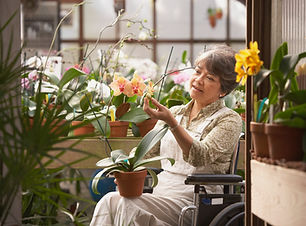
Parkinson's Care
At Onpoint Homecare, we deliver dedicated Parkinson's care within the familiar and comfortable environment of your own home.
As specialists in Parkinson's care, we train our carers to adhere to routines that your loved one is accustomed to, ensuring their independence is preserved as much as possible.
Parkinson's care focuses on providing the necessary support to help you continue living at home. This type of care is tailored to address the unique challenges posed by Parkinson's disease, offering condition-specific assistance for you or your loved one.
What Is Parkinson's
Parkinson's disease is a chronic and progressive movement disorder that affects the nervous system. It primarily impacts movement, but it can also cause a variety of non-motor symptoms. Here are some key points about Parkinson's disease:
Common Symptoms of Parkinson's Disease
Parkinson's disease symptoms can vary, but common ones include:
-
Motor Symptoms: Tremor, bradykinesia, rigid muscles, poor posture and balance, loss of automatic movements, speech changes, and writing changes.
-
Non-Motor Symptoms: Depression, anxiety, constipation, sleep problems, acting out dreams, frequent urination, trouble smelling, cognitive issues, and fatigue.
Causes
-
Dopamine Deficiency: Parkinson's disease occurs when nerve cells in the brain that produce dopamine, a chemical that helps control movement, become impaired or die.
-
Genetic and Environmental Factors: While the exact cause is unknown, a combination of genetic mutations and environmental factors, such as exposure to toxins, may contribute to the development of the disease.
Challenges of Living with Parkinson's
Living with Parkinson's disease presents various challenges that can affect daily life.
These challenges include:
-
Motor Symptoms: Tremors, bradykinesia (slowness of movement), rigidity, and postural instability can make everyday activities difficult.
-
Non-Motor Symptoms: Cognitive changes, mood disorders (such as depression and anxiety), sleep disturbances, and autonomic dysfunction (e.g., constipation, urinary problems).
-
Social and Emotional Challenges: Social isolation, emotional stress, and changes in social life due to physical limitations.
-
Practical Challenges: Medication management, financial strain, and access to care.
Stages of Parkinson's Disease
Parkinson's disease typically progresses through five stages:
-
Stage One: Mild symptoms that do not interfere with daily activities. Symptoms are usually on one side of the body.
-
Stage Two: Symptoms worsen and affect both sides of the body. Daily tasks become more difficult.
-
Stage Three: Balance and coordination are significantly affected, increasing the risk of falls.
-
Stage Four: Severe symptoms that require assistance with daily activities.
-
Stage Five: The most advanced stage, where the person may be bedridden and require full-time care.
Living with Parkinson's disease can be challenging, but there are several strategies to help manage symptoms and maintain a good quality of life:
Medication and Treatment
-
Medications: Work with your healthcare provider to find the right medications to manage symptoms. Adjustments may be needed over time.
-
Therapies: Physical, occupational, and speech therapies can help improve mobility, daily functioning, and communication.
Lifestyle and Daily Activities
-
Exercise: Regular physical activity can help maintain balance, flexibility, and strength. Activities like walking, swimming, or yoga are beneficial.
-
Diet and Nutrition: Eating a balanced diet rich in fruits, vegetables, and whole grains can support overall health. Staying hydrated is also important.
-
Daily Routines: Simplify daily tasks with adaptive tools and techniques. For example, using utensils with larger handles can make eating easier.
Emotional and Social Support
-
Support Groups: Joining a support group can provide emotional support and practical advice from others who understand what you're going through.
-
Mental Health: Managing stress and maintaining a positive outlook are crucial. Consider counselling or therapy if needed.
Safety and Independence
-
Home Modifications: Make your home safer by removing tripping hazards, installing grab bars, and using non-slip mats.
-
Assistive Devices: Use mobility aids to help with balance and prevent falls.
Regular Medical Check-ups
-
Healthcare Team: Regular visits to your healthcare team, including neurologists and therapists, are essential for monitoring and managing the disease.
By incorporating these strategies, individuals with Parkinson's can lead fulfilling lives while managing their symptoms effectively.

Condition-led Care
Each case of Parkinson's is unique. Our Parkinson's specialist carers provide personalised care plans tailored to your loved one's specific condition.

Responsive Support
Our Parkinson's care is adaptable and evolves with your changing needs, which is crucial for managing a complex medical condition.

Experienced Carers
Your loved one will receive dedicated support from carers who are fully trained and equipped to care for individuals with Parkinson's.

A Familiar Environment
Receiving care at home allows your loved one to manage and adapt to their symptoms in a comfortable and secure environment.

Fall Prevention & Management
We collaborate with you and your loved one to make your home safe and free of trip hazards, ensuring they feel confident moving around.

Emotional Support
A key part of our approach to Parkinson's care is providing emotional support and knowledge for both your loved one and the family.
